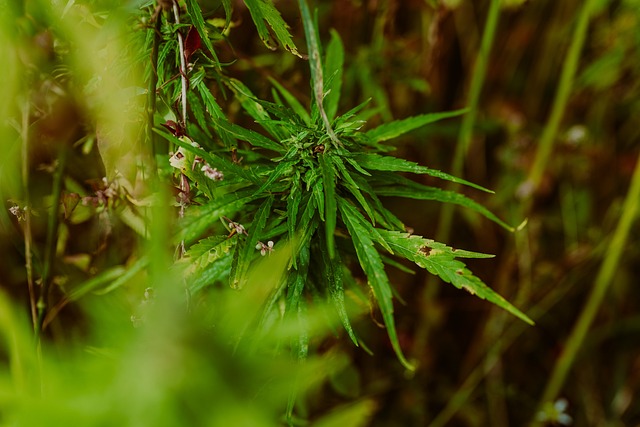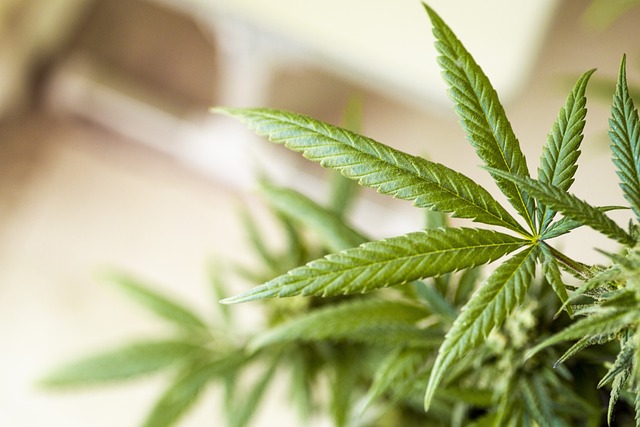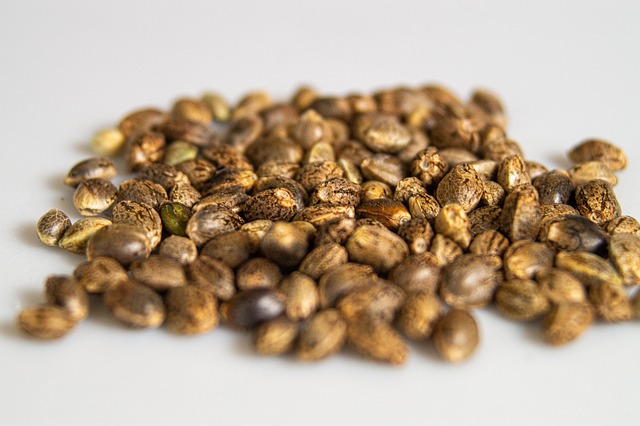As of 2023, THCA (Tetrahydrocannabinolic Acid), a non-psychoactive cannabinoid found in Cannabis sativa and the precursor to THC, is legally permissible in North Carolina when derived from industrial hemp that complies with federal and state regulations, containing less than 0.3% THC. THCA's legal status in North Carolina allows for its use due to potential health benefits such as anti-inflammatory, neuroprotective, and analgesic properties, which may be harnessed without the psychoactive effects of THC. However, it's important for residents to consult healthcare providers before incorporating THCA into their wellness routines due to the need for individual health considerations and the evolving legal context surrounding cannabis products. While THCA itself doesn't induce a 'high', it can lead to mild psychoactive effects if improperly handled. Users should start with low doses, be aware of potential side effects like dry mouth, dizziness, anxiety, and gastrointestinal issues, and ensure their products are from reputable sources. The legal landscape for THCA in North Carolina is dynamic, and staying informed on state regulations is crucial for a safe and compliant consumer experience.
exploration into the multifaceted world of cannabinoids brings us to THCA, or tetrahydrocannabinolic acid—a compound garnering attention for its potential therapeutic properties. As interest in THCA’s effects grows among North Carolina residents, understanding its legal status and side effects becomes paramount. This article delves into the implications of THCA flower consumption, offering a thorough examination of its effects and benefits, the legal landscape in North Carolina, and the scientific research supporting its use. We will navigate through dosing considerations, compare THCA to other cannabinoids, evaluate market quality and safety, and provide guidance on storage to ensure potency. With a focus on personal experiences, medical viewpoints, and interactions with other substances, readers will gain insights into best practices for safe THCA flower use within the legal framework established in North Carolina. This comprehensive overview aims to demystify THCA’s role in health and well-being, ensuring informed decision-making for residents curious about the legal status and potential effects of THCA flower.
- THCA Flower: A Comprehensive Overview for North Carolina Residents
- Understanding THCA: Potential Effects and Benefits
- Legal Landscape of THCA in North Carolina
- The Science Behind THCA: What Research Says
- Possible Side Effects of THCA Flower Consumption
THCA Flower: A Comprehensive Overview for North Carolina Residents

THCA, or Tetrahydrocannabinolic Acid, is a non-psychoactive cannabinoid found in the Cannabis sativa plant that retains its psychoactive properties when decarboxylated, meaning it can transform into THC, the compound known for its mind-altering effects. For residents of North Carolina, understanding the legal status of THCA flower is crucial due to the state’s evolving cannabis laws. As of the knowledge cutoff in 2023, possession and use of CBD products containing less than 0.3% THC are legal in the state, provided they are derived from industrial hemp compliant with federal and state regulations. North Carolina residents interested in exploring the potential benefits of THCA must ensure that their source adheres to these guidelines to remain within the confines of the law. The therapeutic properties of THCA are under research, suggesting it may offer anti-inflammatory, neuroprotective, and analgesic effects without the psychoactive high associated with THC. This makes it an intriguing option for individuals seeking the potential wellness benefits of cannabinoids without impairment. Residents looking to incorporate THCA flower into their wellness routine should familiarize themselves with local dispensary offerings, as well as dosage guidelines to maximize safety and efficacy. It’s important to consult with a healthcare provider before incorporating any new substance into one’s health regimen, especially in the context of North Carolina’s specific legal landscape regarding cannabis products.
Understanding THCA: Potential Effects and Benefits

Cannabidiolic acid (THCA) is a non-psychoactive compound found in cannabis and hemp plants, often precursor to tetrahydrocannabinol (THC) when heated. As interest in the potential benefits of cannabinoids grows, THCA has garnered attention for its therapeutic properties. Preliminary research suggests that THCA may offer a range of health benefits, including anti-inflammatory, neuroprotective, and analgesic effects. These potential benefits have sparked interest in the use of THCA-rich products, particularly in regions where such derivatives are legal. In North Carolina, for instance, the legal status of THCA is evolving, with derived products like flowers being subject to specific state regulations. Consumers interested in exploring the effects of THCA should first verify its legality within their local jurisdiction and adhere to state laws. While the full scope of THCA’s effects is still under scientific scrutiny, early indications are promising for those seeking natural alternatives for pain relief, managing inflammation, and potentially combating neurodegenerative diseases. As with any supplement or medication, it is crucial to consult with a healthcare professional before incorporating THCA into one’s wellness routine, especially given the nuanced legal landscape surrounding its use.
Legal Landscape of THCA in North Carolina

In recent years, the legal status of THCA flower, which is the uncannabinoid acid form of THC found in the Cannabis sativa plant, has been a subject of considerable debate and legislative action. As of the current understanding, THCA remains a controlled substance under federal law as per the Controlled Substances Act. However, at the state level, North Carolina’s legal landscape regarding THCA has evolved. The North Carolina Compassionate Care Act was enacted in 2014, allowing for the use of CBD oils with a high concentration of CBD and less than 0.9% THC to treat certain medical conditions. While this legislation initially did not explicitly address THCA, subsequent amendments have expanded the scope of allowable cannabinoids for therapeutic use. It’s important for individuals to note that while there is a growing body of literature on the potential benefits of THCA and its derivatives, the legalities surrounding their possession, sale, and use in North Carolina are subject to change as state policies continue to develop in response to both public opinion and ongoing legal challenges. Therefore, anyone interested in utilizing or researching THCA within the state should stay informed about the latest legislative updates to ensure compliance with current laws.
The Science Behind THCA: What Research Says

Delta-9-tetrahydrocannabinolic acid (THCA) is a non-psychoactive compound found in the Cannabis sativa plant, which precedes THC when cannabis is heated or decarboxylated. Research on THCA has been growing as more states, including North Carolina, explore its legal status and potential therapeutic benefits. Studies suggest that THCA interacts with the body’s endocannabinoid system through its affinity for both CB1 and CB2 receptors, indicating a broad range of physiological effects. Preclinical evidence indicates that THCA may have anti-inflammatory, anti-nausea, anti-emetic (anti-vomiting), neuroprotective, and analgesic properties. The legal status of THCA-rich products varies across the United States; in North Carolina, certain derivatives and extracts are permissible under state law, reflecting a complex regulatory landscape that is continually evolving. As research continues to uncover the potential effects of THCA, it remains a subject of scientific interest due to its distinct chemical structure and the implications this has for human health and well-being. The body of evidence supporting the therapeutic potential of THCA is growing, with ongoing trials potentially elucidating its efficacy further. This scientific exploration is critical in understanding how THCA might be utilized within legal frameworks to benefit individuals’ health, especially as more states consider its legal use.
Possible Side Effects of THCA Flower Consumption

THCA, or tetrahydrocannabinolic acid, is a non-psychoactive cannabinoid found in the Cannabis sativa plant that is known to convert into THC, its psychoactive counterpart, when exposed to heat or light. While considered legal in North Carolina under certain conditions, consumers should be aware of the potential side effects associated with THCA flower consumption. Reports suggest that while THCA itself does not produce the high commonly associated with THC, it may still cause some adverse reactions in certain individuals. These can include mild psychoactive effects, particularly if the THCA has not been fully decarboxylated, leading to unexpected intoxication. Other side effects might include dry mouth and eyes, dizziness, anxiety, paranoia, and potential gastrointestinal issues such as nausea or diarrhea. It is important for users to start with small doses to gauge their body’s response and to consult with a healthcare professional before incorporating THCA flower into their wellness regimen, especially if they have underlying health conditions or are taking other medications.
Furthermore, the side effects profile of THCA may differ from that of THC due to its distinct pharmacological properties. Research indicates that THCA may exert neuroprotective and anti-inflammatory effects, which could be beneficial for certain medical conditions. However, as with any cannabinoid product, individual experiences can vary significantly, and the side effects profile may evolve as more research becomes available. Users in North Carolina, where THCA is legal under specific state laws, should adhere to dosing guidelines and follow best practices for storage and use to minimize potential negative effects. It is also advisable to purchase from reputable sources to ensure the purity and potency of the product.
THCA, or Tetrahydrocannabinolic Acid, has garnered attention for its potential therapeutic properties and legality within North Carolina. This article has delved into the multifaceted aspects of THCA, offering a thorough overview for residents curious about this cannabinoid. From its scientific underpinnings to the legal framework governing its use in the state, readers have been equipped with comprehensive knowledge on the topic. It’s clear that while THCA may offer various benefits and effects, it’s crucial to approach its consumption with understanding and caution. The potential side effects outlined highlight the importance of responsible usage and adherence to North Carolina’s regulations regarding THCA flower. As THCA continues to be studied and regulated, residents of North Carolina have an opportunity to make informed decisions about its use in their wellness routines.
